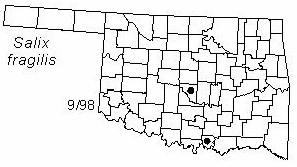Tree to 20 m (65 ft) tall. Bark dark brown or dark gray, deeply divided into scaly forking ridges. Twigs olive to yellowish-brown, brittle. Branchlets spreading, green to reddish, hairy when young but becoming glabrous. Leaves alternate, long, lanceolate or linear-lanceolate, 7-13 cm (2.8-5 in) long and 1.5-3 cm (0.6-1.2 in) wide, coarsely serrate, shiny yellowish-green above, pale to white-glaucous below. Flowers in catkins 3-6 cm (1.2-2.4 in) long at ends of short leafy branchlets, very small, numerous, with yellowish hairy scales, pistillate and staminate on different trees, appearing in early spring with the leaves. Fruits numerous conical capsules about 5 mm (0.2 in) long, opening in late Spring to release many very small cottony-tufted seeds.
Distribution: Native to Asia, but escaping in scattered locations across North America.
Habitat: Usually found in wet soil near streams and lakes.
NWI status: none
Comment: Salix is the old Latin name for the willows; fragilis refers to the brittle twigs.
Distribution in Oklahoma: 
BACK
NEXT
RETURN TO INDEX
Last update: 9/17/99
 Go to Oklahoma Biological Survey Home Page
Go to Oklahoma Biological Survey Home Page
 Disclaimer
Disclaimer